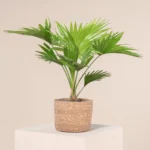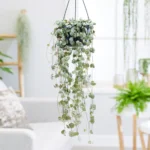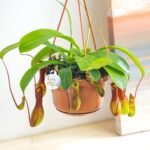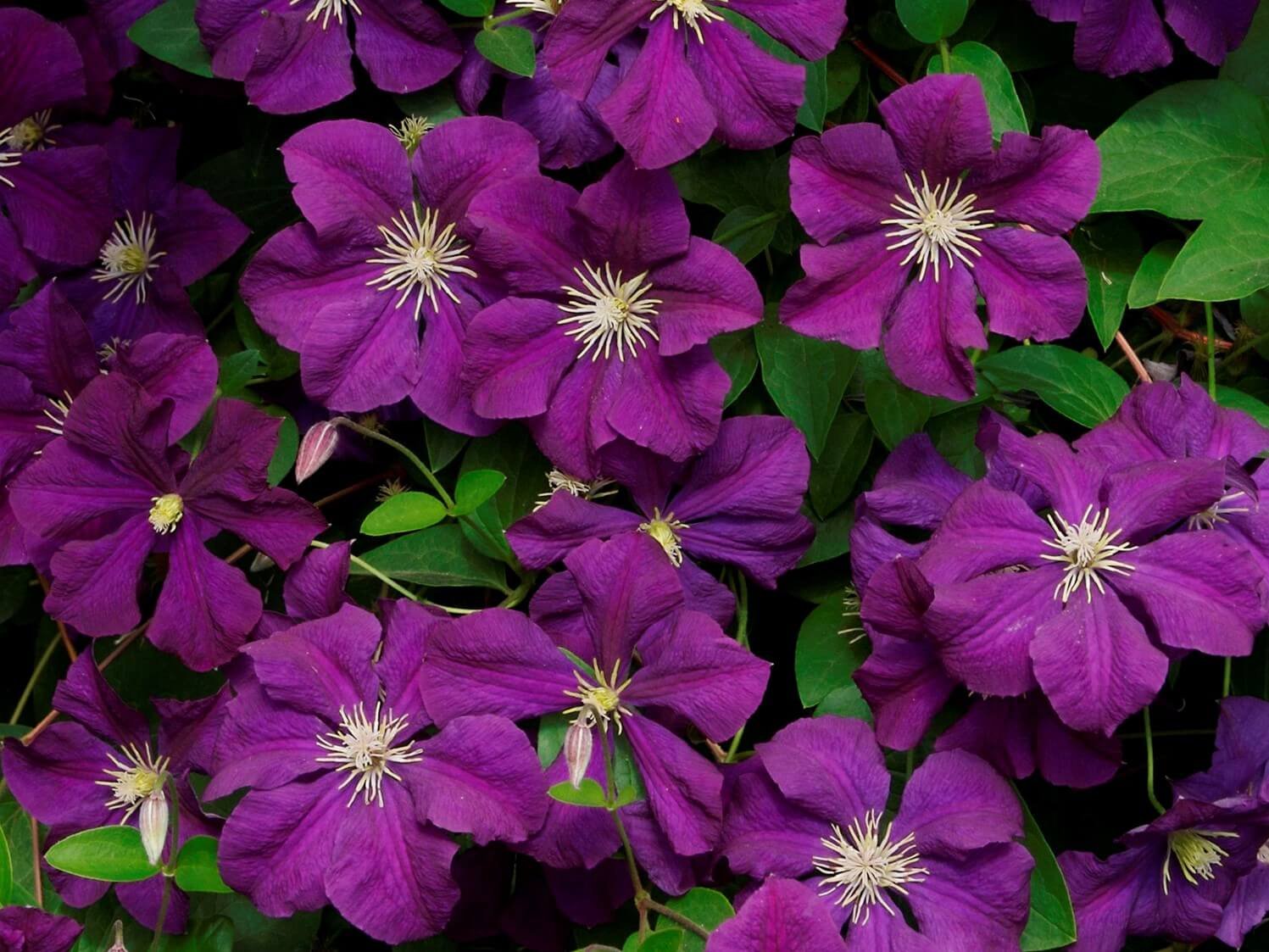Categories: Flowering Vines, Perennials, Garden Climbers, Ornamental Plants, Summer-Blooming Plants
Jackman’s Clematis, Clematis ‘Jackmanii’, climbing plants, purple flowers, garden vines

Jackman’s Clematis: Cultivating the Classic Purple Beauty
Introduction
Jackman’s Clematis (Clematis ‘Jackmanii’) is a stunning flowering vine that has captivated gardeners for over 150 years. Known for its large, velvety purple blooms and vigorous growth, this clematis variety has earned its place as one of the most popular and beloved climbing plants. In this comprehensive guide, we’ll explore the history, care, and cultivation of this garden favorite.
History and Origin
Jackman’s Clematis was first introduced in 1862 by George Jackman and his son, also named George, at their nursery in Woking, Surrey, England. It was created by crossing C. lanuginosa with C. viticella ‘Hendersonii’. The resulting hybrid combined the large flowers of C. languinosa with the rich color and free-flowering nature of C. viticella.
This variety quickly gained popularity and has remained a gardening staple ever since, earning the Royal Horticultural Society’s Award of Garden Merit.
Plant Description
Jackman’s Clematis is characterized by:
- Large, velvety flowers in a deep purple-violet color, typically 4-6 inches across
- Blooms with 4 sepals (petal-like structures) and prominent yellow stamens
- Vigorous climbing growth, reaching heights of 10-12 feet or more
- Dark green, compound leaves
- Flowering period from mid-summer to early fall, with potential for a second flush of blooms
- Belongs to Pruning Group 3, meaning it blooms on new wood

Plant Care
Light Requirements
Jackman’s Clematis prefers full sun to partial shade. In hotter climates, some afternoon shade can help maintain flower color and plant vigor.
Soil and Planting
Plant in rich, well-draining soil. Clematis prefer their roots cool and their foliage in the sun, so mulch the base or plant low-growing plants around it.
Watering Needs
Water deeply and regularly, especially during the first growing season. Maintain consistent moisture but avoid waterlogged soil.
Temperature and Humidity
Hardy in USDA zones 4-8. Tolerates a wide range of humidity levels but prefers moderate humidity.
Fertilizer
Feed with a balanced, slow-release fertilizer in spring. Follow up with liquid fertilizer every 4-6 weeks during the growing season.
Support
Provide sturdy support such as a trellis, fence, or arbor. The vine climbs using leaf stalks, so thin supports work best.

Pruning
Jackman’s Clematis belongs to Pruning Group 3:
- In late winter or early spring, cut back all old growth to about 12-18 inches from the ground.
- Remove any dead or weak stems.
- This encourages strong new growth and abundant blooms.
Propagation
Propagate Jackman’s Clematis through:
- Layering:
- In spring, pin a low-growing stem to the ground.
- Cover with soil, keeping the growing tip exposed.
- Once rooted, separate from the parent plant.
- Cuttings:
- Take softwood cuttings in early summer.
- Use rooting hormone and plant in a well-draining medium.
- Keep moist and warm until rooted.
Pests and Diseases
Common Pests
- Aphids
- Spider mites
- Earwigs
Treat with insecticidal soap or neem oil.
Diseases
- Clematis wilt (fungal disease)
- Powdery mildew
- Leaf spot
Prevent by ensuring good air circulation and avoiding overhead watering.

Common Problems
- Lack of flowers: Often due to improper pruning or insufficient sunlight.
- Yellowing leaves: Can indicate nutrient deficiency or poor drainage.
- Clematis wilt: Sudden collapse of stems and leaves. Prune affected areas and improve air circulation.
- Winter damage: Protect the crown of the plant with mulch in colder regions.
Companion Planting
Jackman’s Clematis pairs well with:
- Roses (for the classic “roses and clematis” combination)
- Other climbing plants like honeysuckle or jasmine
- Shrubs that can provide support and contrast
Uses in the Garden
- Vertical interest: Train on trellises, arbors, or fences.
- Container gardening: Can be grown in large pots with proper support.
- Covering unsightly structures: Use to beautify walls or hide compost bins.
- Cut flowers: The large blooms make striking additions to floral arrangements.
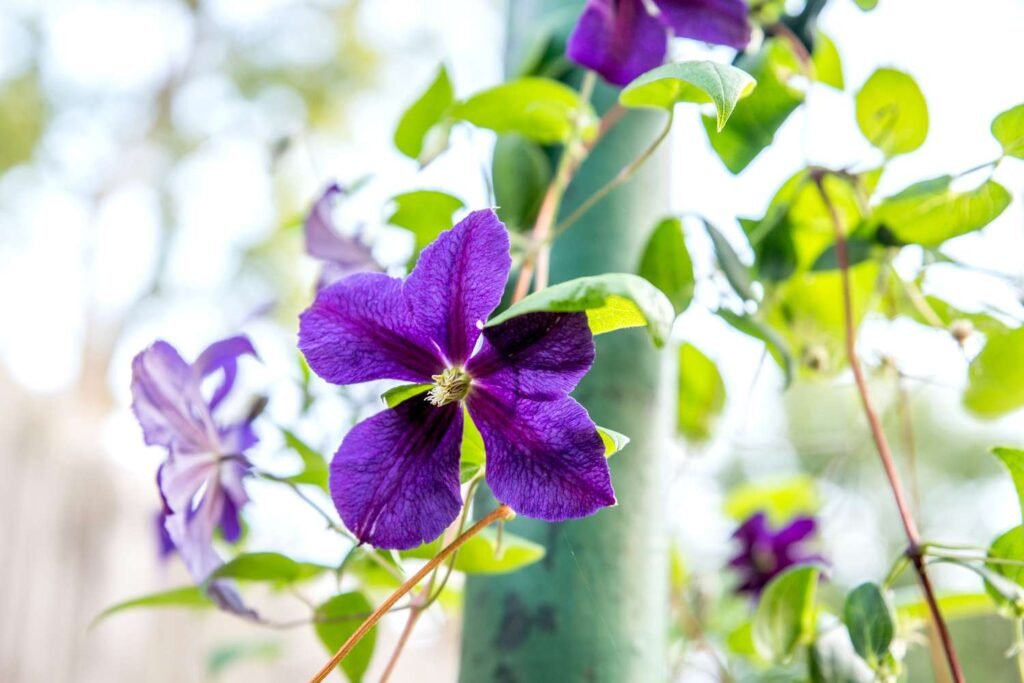
FAQs
How long does it take for Jackman’s Clematis to bloom?
When planted from a nursery plant, it typically blooms in its first year. From seed, it may take 2-3 years.
Can Jackman’s Clematis be grown in containers?
Yes, use a large container (at least 18 inches deep) with good drainage and provide sturdy support.
Is Jackman’s Clematis deer resistant?
Clematis are generally not a favorite food of deer, but they may browse young growth if other food is scarce.
How do I know if my clematis has clematis wilt?
Symptoms include sudden wilting and blackening of leaves and stems, often on just one or a few stems.
Tips for Success
- Plant with the crown about 2 inches below soil level to encourage multiple stem growth.
- Provide a sturdy support structure at planting time to avoid disturbing roots later.
- Mulch around the base to keep roots cool and moist.
- In hot climates, provide afternoon shade to maintain flower color.
- Be patient – clematis often take a few years to establish before reaching their full potential.
Quick Facts
| Attribute | Detail |
|---|---|
| Scientific Name | Clematis ‘Jackmanii’ |
| Common Names | Jackman’s Clematis, Jackmanii Clematis |
| Origin | Hybrid created in England, 1862 |
| Plant Type | Deciduous climbing vine |
| Height | 10-12 feet (3-4 meters) |
| Flower Color | Deep purple-violet |
| Blooming Period | Mid-summer to early fall |
| USDA Hardiness Zones | 4-8 |
| Pruning Group | 3 (Hard prune in late winter/early spring) |
| Toxicity | Mildly toxic if ingested |
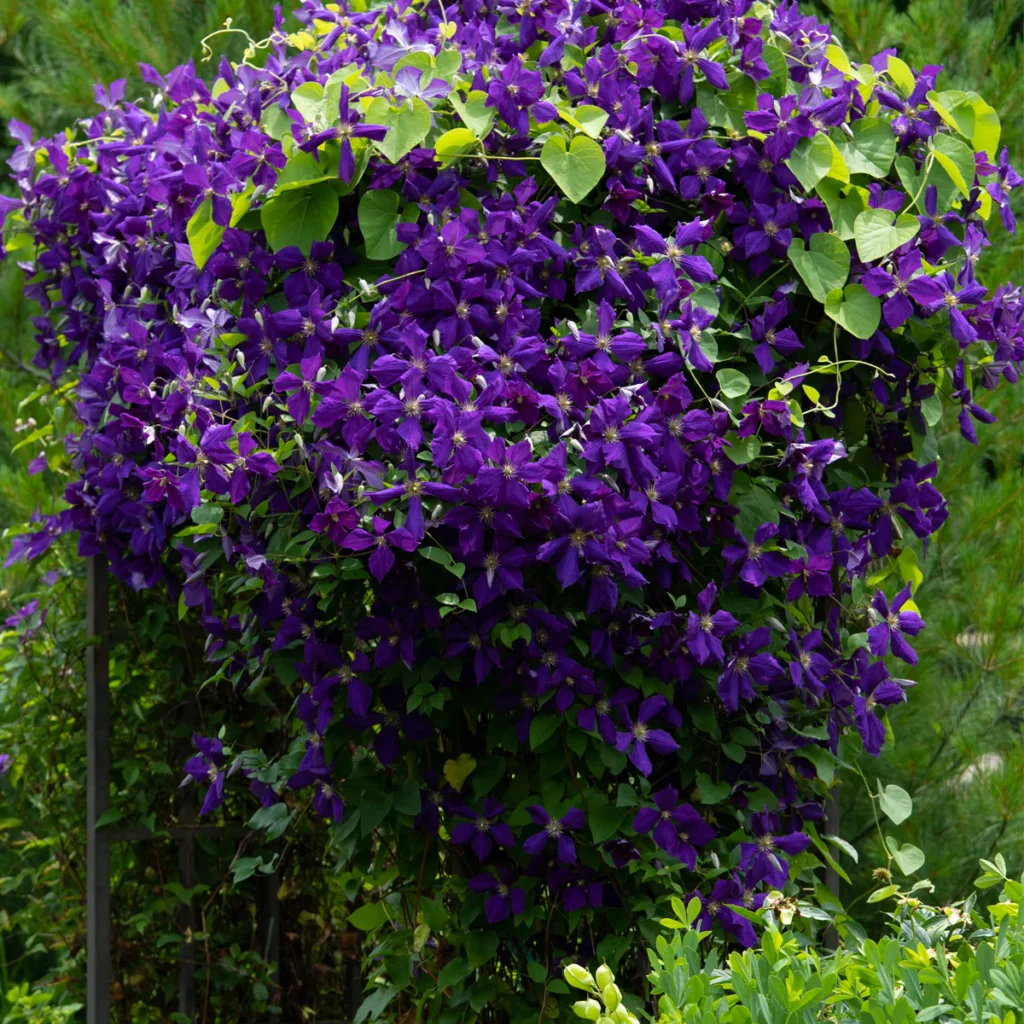
Conclusion
Jackman’s Clematis, with its stunning purple blooms and vigorous growth, has rightfully earned its place as a garden classic. While it requires some specific care, particularly in terms of pruning and support, the reward is a breathtaking display of flowers that can transform any garden space. Whether you’re looking to add vertical interest to your garden, cover an unsightly structure, or create a focal point, Jackman’s Clematis is an excellent choice. With the care tips and information provided in this guide, you’re well-equipped to grow and nurture this beautiful climbing vine. Happy gardening!
Views: 7


